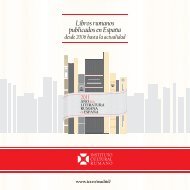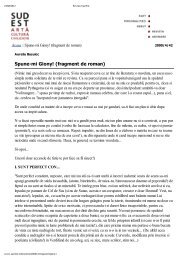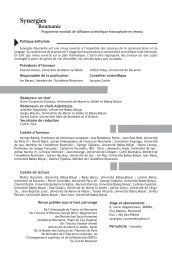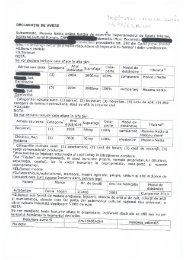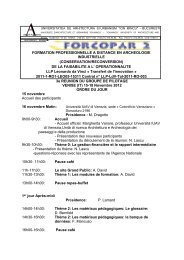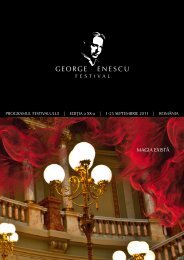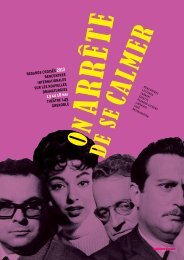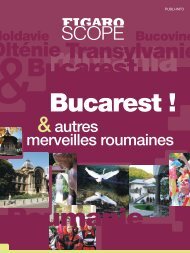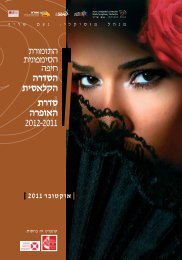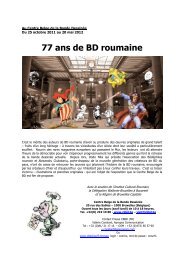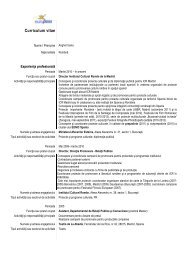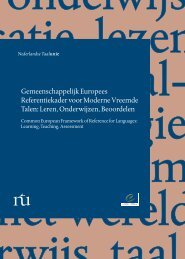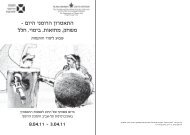Raport ICR 2011 - Institutul Cultural Român
Raport ICR 2011 - Institutul Cultural Român
Raport ICR 2011 - Institutul Cultural Român
You also want an ePaper? Increase the reach of your titles
YUMPU automatically turns print PDFs into web optimized ePapers that Google loves.
16<br />
RAPORT<br />
DE ACTIVITATE<br />
<strong>2011</strong><br />
contact. Cooperation allows for the separation of<br />
value-related criteria produced by the market. Cooperation<br />
therefore does not mean putting either the markets or the<br />
value-related criteria together. This means there is a deeper<br />
still level of cultural contact, going beyond cultural<br />
cooperation the same way cultural cooperation goes beyond<br />
cultural diplomacy. It is about bringing cultural markets in<br />
contact, without dissolving them into one single market.<br />
In our jargon we say that we are developing a<br />
“common theme, local delivery” type of approach. It is, in<br />
fact, much more than this.<br />
EUNIC is going to be confronted in Europe by<br />
increasingly uniied cultural markets, while outside Europe<br />
it will come against cultural markets either indifferent or<br />
hostile to uniication, or tensely engaged in the<br />
centre/periphery, developed/backward dialectics. EUNIC<br />
will be unable to respond undifferentiatedly to this type of<br />
challenges which are in their turn deeply non-homogenous.<br />
The policy to apply here seems to be the one dictated by<br />
completely abandoning any hidden agenda, even a<br />
progressive one. EUNIC, outside Europe, should be an old<br />
precious looking glass of local societies. The activity of<br />
EUNIC members should make visible to Europe the<br />
irreducible speciicity of non-European cultures. Of course,<br />
EUNIC is going to promote European values and topics.<br />
Nevertheless, should it intend to penetrate local societies, it<br />
will have to discard the pretention it knows better what it is<br />
all about – that it knows while the rest ignore, that progress<br />
is his while backwardness is theirs. Through the eyes of<br />
EUNIC clusters outside Europe one should be able to see not<br />
the state but the societies.<br />
Within Europe the task of EUNIC might be<br />
contributing culturally to producing a content for European<br />
identity. This is already happening. In Bucharest, for<br />
instance, I have witnessed a vivid feeling of unity and<br />
fraternity coming into existence as a result of the simple act<br />
that all the directors of active cultural institutes in the<br />
Capital of Romania are meeting regularly. It was out of<br />
coming to know each other that ideas resulted, not the other<br />
way round. At the foundation of each EUNIC cluster lies<br />
friendship, perhaps not just paradoxically. Not only<br />
knowledge, abilities, competencies, etc., but also friendship<br />
matters. This thing spreads throughout society in a more<br />
durable way than abilities. Capacity building should be seen,<br />
in my opinion, in terms of getting friendly.<br />
I do stress imponderable things because they are<br />
rarely discussed if at all. In South Africa, where I headed the<br />
Sub-Saharan regional branch of EUNIC, I heard Achille<br />
Mbembe say that he’d had enough of Africans being treated<br />
like starving people. We want culture not compassion<br />
surrogates for our caved-in stomachs. Mbembe severely<br />
criticized the instrumentalization of culture.<br />
What I mean is that in certain instances even the<br />
soft power of certain cultural social-support programmes is<br />
too hard. This should be food for thought. There are times<br />
when even compassion is a sign of arrogance. EUNIC has the<br />
momentous chance of building outside Europe programmes<br />
for bringing cultural markets rather than specialized<br />
cultural institutes in direct contact. Through the nature of its<br />
activity and its capacity to extract out of a given cultural<br />
environment the tacit knowledge incorporated therein,<br />
EUNIC has many keys in its hands, most of them as yet<br />
undiscovered.<br />
I have a feeling that not even we, colleagues<br />
involved in setting up and consolidating our network see<br />
clearly enough the width of this project called EUNIC. We<br />
speak about cultural programmes, cooperation, capacity<br />
building, unifying and putting in contact cultural markets,<br />
but there is more than this at stake. In more than one sense,<br />
EUNIC is a laboratory for the future.<br />
For us, Europeans, EUNIC is a laboratory in which<br />
experiments are carried out on the type of moral and<br />
intellectual relations that will lie at the foundations of the<br />
new European identity. EUNIC is making its own direct, if<br />
discreet, contribution to the shaping of a new European<br />
identity, to experimenting the moral equality of all the<br />
European actors, irrespective of the start inequality of their<br />
resources. Today’s Europe does not look like yesterday’s,<br />
and the society being prepared by the EU looks more like the<br />
one described by Avishai Margalit in The Decent Society, than<br />
the one described by Marx in The Communist Manifesto.<br />
EUNICS’s contribution to shaping a decent society in Europe<br />
is a most important one.<br />
For societies outside Europe, I like to think that




